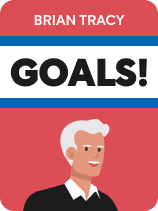

This article is an excerpt from the Shortform book guide to "Goals!" by Brian Tracy. Shortform has the world's best summaries and analyses of books you should be reading.
Like this article? Sign up for a free trial here .
Do you struggle to find the motivation to work on your goals? Do you often get sidetracked?
Once you’ve figured out what goals to pursue and where to start, turn your attention to why you want to achieve them. The road to your goals can be long and arduous, so reminding yourself of your “Why” can keep you going despite the obstacles.
Here’s how to know your “Why,” according to motivational speaker Brian Tracy.
Find Your “Why”
Start by listing all the reasons you have to pursue each of your goals. Write as many reasons as you can think of—having more reasons increases your motivation, persistence, and determination.
For example, if your goal is to lose 30 pounds, one of your reasons might be “to feel comfortable in a swimsuit next summer.” However, you might delay taking action if the summer is still months away. Having other reasons such as “to have more energy,” “to stop taking medication,” and “to improve my sex life” can increase your motivation and get you moving.
(Shortform note: Tracy emphasizes the importance of finding reasons to pursue goals to keep you motivated to achieve them. However, some argue that motivation can only get you so far when it comes to chasing success. To keep going even when you’ve lost your drive, design an environment that helps you reach your goals with less effort. You can do this by automating decision-making, incorporating good habits into your daily routine, and taking away negative influences.)
Determine Your “When”
Once you know your “Why,” determine your “When” by setting some deadlines. It’s okay if your progress isn’t perfectly aligned with your predicted timeline—Tracy says you might achieve some goals earlier and others later than planned. What matters is that you have a target timeline to aim for.
(Shortform note: Tracy doesn’t mention why deadlines are so important to goal-setting. Deadlines are necessary because they give you a sense of urgency, force you to think about how to move forward, and help you manage your priorities. Without deadlines, you procrastinate or spend too much time on easier tasks that are only vaguely related to your goal.)
Tracy notes that some deadlines might be five or 10 years into the future, so you might get overwhelmed by the long road ahead. He recommends that to better approach intimidating long-term goals, you break down your deadlines into more manageable sub-deadlines or short-term goals, such as tasks you can accomplish each week or month. For example, if your goal is to make a million dollars in 10 years, your short-term goal might be to invest a specific amount each month. Meeting your short-term goals not only keeps you moving but also makes you feel accomplished, which in turn boosts your confidence and motivation.
| How to Transform Big Goals into Actionable Steps Breaking down deadlines into sub-deadlines, as Tracy recommends, makes daunting goals seem more doable. In 12 Rules or Life, author Jordan Peterson gives practical tips for turning big goals into more approachable tasks: Think about one thing you can do today that will make your life a little better at the end of the day than it was in the morning. Be kind to yourself. Treat yourself the way you want an ideal boss to treat you—you wouldn’t want a boss who never thinks your work is good enough. Reward yourself for small wins. |

———End of Preview———
Like what you just read? Read the rest of the world's best book summary and analysis of Brian Tracy's "Goals!" at Shortform .
Here's what you'll find in our full Goals! summary :
- Brian Tracy's steps to setting and reaching your goals
- How to approach your goals with the right mentality
- Why persistence is more important than courage






